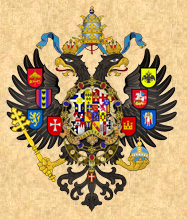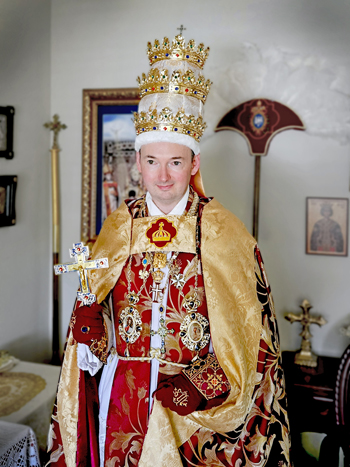|

Declaration of the Supreme Pontiff on the Inheritance of Rome-Ruthenia
United Roman-Ruthenian Church
EN | IT | RU
from the Pontifical Court
5 February 2025

Brothers and Sisters in Christ,
We live in an age of abandonment—of faith, of kingship, of Christian
civilization itself. The inheritance of our ancestors has been cast
aside, replaced by ideologies that seek to divide, secularize, and
destroy the sacred unity of the Christian world. But: Rome did not die.
Holy Russia did not die. The mission of Christ’s empire did not end. It
lives still.
Through the providence of God and its rightfully-inherited and
transferred sacred patrimony, the United Roman-Ruthenian Church and the
Pontifical Imperial State of Rome-Ruthenia carry forth what has been
abandoned by others.
The
temporal patrimony of the Roman Church, once held by the Roman Popes,
was relinquished—but not erased. Through rightful succession, it was
transferred and restored, not in a corrupted or secularised form, but
within the Church that remains faithful to the Apostolic and Orthodox
faith. Likewise, the Kingship of Russia and All Rus’, granted
first by the Byzantine Patriarch and then by the Roman Pope, returned,
after its illegal dissolution as a functioning state, to Rome, and from
there, inherited as part of the Roman-Ruthenian Church and State's
recognised temporal patrimony.
This is not a matter of ambition or human will, but of divine
stewardship. We did not take; we received what had been rightfully
given, abandoned, and restored through legitimate succession.
We
do not assert this as ambition, but receive it as those to whom it has
been entrusted—an unbroken legacy of apostolic, imperial, and
ecclesiastical succession. The mission did not end with Byzantium or
Latin Rome. It
did not end with the fall of the Russian throne. It continues in all
who remain faithful.
As Prince-Bishop of Rome-Ruthenia, We do not stand as a claimant to
worldly power or governance of modern civil states, but as a guardian
of a Sacred Trust. The Church stands above the state, always and
everywhere, and only in humble obedience to Christ can any leader serve
rightly. Those who wield authority but reject Christian kingship rule
in rebellion against God.
Thus, we must declare: Christ First—Always.
Not nations first. Not men first. Christ first. This is the only path to the renewal of Christian civilization.
We in humility call upon all who share this inheritance—those of the
Roman, Russian, Slavic, Eastern Roman, and Latin Christian traditions, those who still
honor the Orthodox faith, those who remain faithful to the Apostolic
path—to stand together in this mission. Not in ambition, but in service
to Christ. Not in conquest, but in spiritual guardianship.
With steadfast commitment, we continue to safeguard what has been
entrusted to us. Our mission transcends earthly recognition, just as
Christ’s Kingdom is not of this world. What has been given remains,
unwavering and enduring. We
stand firm in Christ. This is not the end. It is the continuation. We
are the last true embodiment of this sacred trust and inheritance, and
we will uphold it until the Lord returns in glory.
Радислав Пп. I
H.A.H. Radislav (Rutherford) I, Prince-Bishop of Rome-Ruthenia
Note:
The P.I. Household, as a matter of policy, is not involved and does not
seek to be involved in the governance, political parties, or politics
of any current civil government in any nation. The United
Roman-Ruthenian Church and the Pontifical Imperial State of
Rome-Ruthenia constitute an ecclesiastical sovereignty by right of Rome
as heir to the Roman Empire and Pontifical Kingdom of Ruthenia and All
Rus' with an independent government in special consultative status with
the United Nations Economic and Social Council. The United
Roman-Ruthenian Church is an autocephalous Catholicate. The governments
of the modern republics of Italy, German, France, Switzerland, Russia,
Belarus, Ukraine, and the United States, and of the modern kingdoms of
Great Britain and Spain, as well as the European Union and all other
civil states, are not affiliated with the United Roman-Ruthenian Church
and the Pontifical Imperial State.
|


